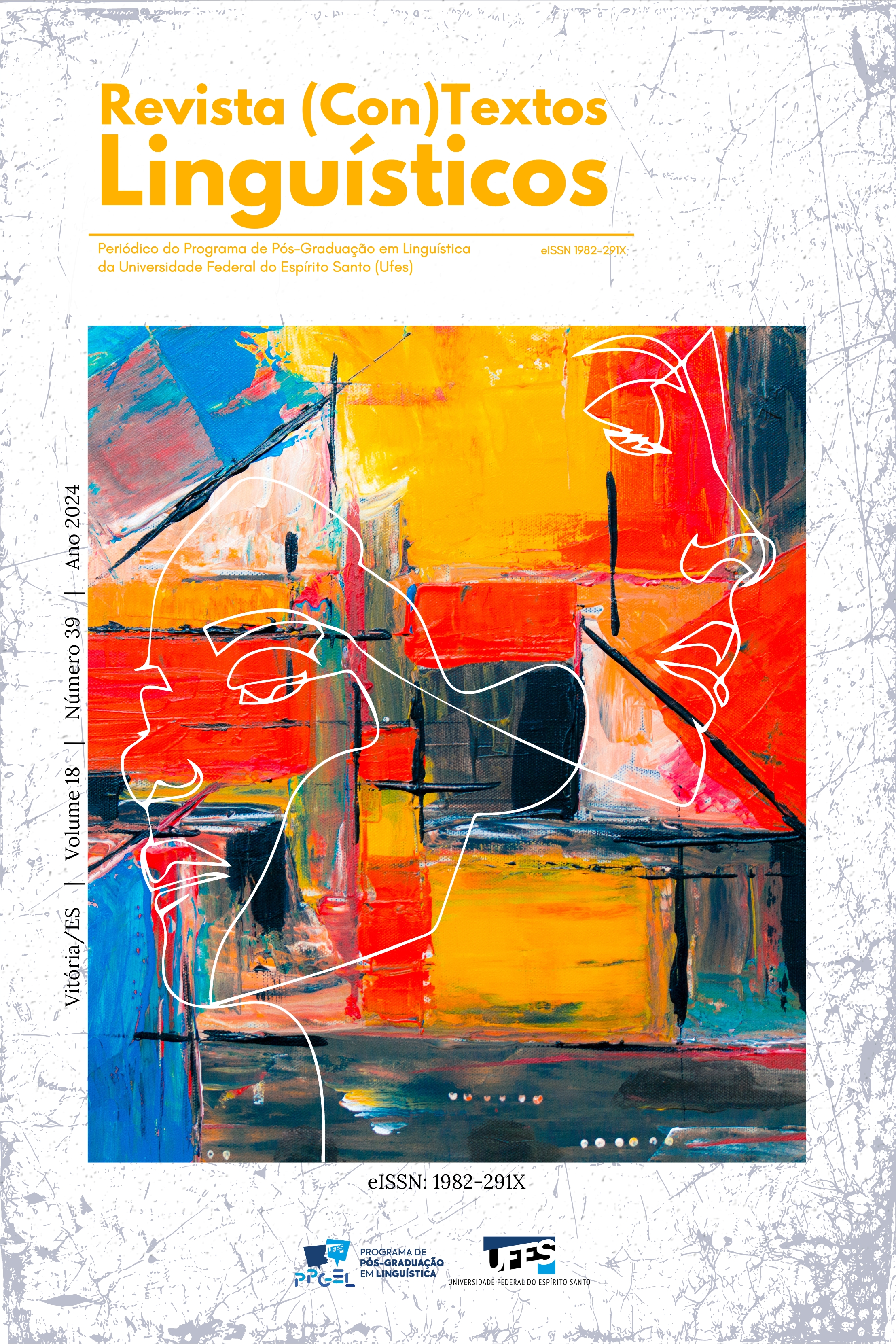Possíveis implicaturas convencionais disparadas por sentenças ergativas seguidas da minioração “sozinho(a)”
DOI:
https://doi.org/10.47456/rctl.v18i39.43908Palavras-chave:
Implicaturas convencionais, Pragmática, Ergatividade, FuncionalismoResumo
Este artigo busca investigar a hipótese de estruturas ergativas dispararem implicaturas convencionais, explorando a possibilidade de inferências geradas não apenas por palavras específicas, mas também por estruturas sintáticas. Usando arcabouço teórico funcional-pragmático com autores como Cançado e Ciríaco (2009) e Grice (1975), esta pesquisa qualitativa se vale de dados retirados de reclamações no Reclame Aqui. A metodologia inclui a redução de dados, sua análise e a apresentação de conclusões. Esta investigação pode ter valor para a linguística ao aproximar a sintaxe funcional e a pragmática, numa tentativa de delimitar mais claramente fronteiras entre semântica e pragmática, ampliando o campo de estudo desta última. Ao testar se implicaturas são disparadas por itens lexicais e sintáticos, a pesquisa conclui que (a) estruturas ergativas seguidas de "sozinho(a)" geram implicaturas convencionais; (b) a paráfrase transitiva acarreta – não implica – informação; e (c) atribuir às implicaturas convencionais disparadores sintáticos reconsidera a ideia de que são apenas semânticas.
Downloads
Referências
ANDRADE, P. R. Tirinhas cômicas online: implicatura, pressuposição e multimodalidade. In: LINS, M. P. P. (org.). Implicaturas em Gêneros Textuais. Vitória: UFES, Programa de Pós-Graduação em Linguística, 2019.
ARMENGAUD, F. A pragmática. São Paulo: Parábola Editorial, 2006.
BACH, K. The myth of conventional implicature. Linguistics and philosophy, v. 22, n. 4, p. 327-366, 1999. Disponível em: https://link.springer.com/article/10.1023/A:1005466020243. Acesso em: 25 nov. 2023.
BASSANI, I. S. (Des)construindo relações entre agentividade, causa e morfologia em verbos de mudança de estado do português brasileiro. DELTA: Documentação e Estudos em Linguística Teórica e Aplicada, [S. l.], v. 34, n. 2, p. 577-609, 2018. Disponível em: https://revistas.pucsp.br/index.php/delta/article/view/39345. Acesso em: 7 dez. 2023.
CANÇADO, M. Posições argumentais e propriedades semânticas. DELTA: Documentação e Estudos em Linguística Teórica e Aplicada, v. 21, n. 1, p. 23-56. 2005. Disponível em: https://www.scielo.br/j/delta/a/BS5N8qTGnJkzH3FTsgBWvzh/#. Acesso em: 3 dez. 2023.
CHUEKE, G. V.; LIMA, M. C. Pesquisa Qualitativa: evolução e critérios. Revista Espaço Acadêmico, v. 11, n. 128, p. 63-69, 2012. Disponível em: https://www.researchgate.net/profile/Gabriel-Chueke/publication/279664207_Pesquisa_Qualitativa_Evolucao_e_Criterios/links/55c1758908ae092e96684604/Pesquisa-Qualitativa-Evolucao-e-Criterios.pdf. Acesso em: 12 jul. 2023.
CIRÍACO, L. A família de construções ergativas no português. PERcursos Linguísticos, Vitória, v. 7, n. 14, p. 421–435, 2017. Disponível em: https://periodicos.ufes.br/percursos/article/view/15658. Acesso em: 4 dez. 2023.
CIRÍACO, L.; CANÇADO, M. A alternância causativo-ergativa no português brasileiro. Matraga, [S. l.], v. 16, n. 24, 2009. Disponível em: https://www.e-publicacoes.uerj.br/matraga/article/view/27804. Acesso em: 4 dez. 2023.
CUNHA, M. A.; SOUZA, M. M. Transitividade e seus contextos de uso. São Paulo: Cortez, 2011.
DUCROT, O. A pragmática e o estudo semântico da língua. Letras de Hoje, [S. l.], v. 40, n. 1, 2013. Disponível em: https://revistaseletronicas.pucrs.br/index.php/fale/article/view/13721. Acesso em: 12 jul. 2024.
GIVÓN T. Functionalism and grammar. Amsterdam: Benjamins, 1995.
GRICE, H. P. Lógica e conversação. In: DASCAL, M. (org.). Fundamentos metodológicos da lingüística (IV). Trad. João Wanderley Geraldi. Campinas, Unicamp, 1975/1982.
GRIMSHAW, J. B. Argument structure. The MIT Press. Cambridge, Massachusetts, 1990.
HOPPER, P. J.; THOMPSON, S. A. Transitivity in Grammar and discourse. Language, v. 56, n. 2, p. 251-299, 1980. Disponível em: https://romanistik.uni-freiburg.de/raible/Lehre/2006/Materialien/Hopper_Thompson.pdf. Acesso em: 7 dez. 2023.
HUBERS, F.; SNIJDERS, T.; HOOP, H. How the brain processes violations of the grammatical norm: An fMRI study. Brain and Language, v. 163, p. 22-31, 2016. Disponível em: https://pure.mpg.de/rest/items/item_2353575_3/component/file_2353574/content. Acesso em: 7 dez. 2023.
LEVIN, B. English verb classes and alternations: a preliminary investigation. The University of Chicago Press, Chicago, Illinois, 1993.
LEVIN, B.; RAPPAPORT-HOVAV, M. Unaccusativity: At the syntax-lexical semantics interface. The MIT Press. Cambridge, Massachusetts, 1995.
MILES, M. B.; HUBERMAN, A. M. Qualitative data analysis: An expanded sourcebook. Thousand Oaks, CA: Sage, 1994.
MÜLLER, A. L. P.; VIOTTI, E. C. Semântica Formal. In: FIORIN, J. L. (org.). Introdução à Linguística II: princípios de análise. 5. ed. São Paulo: Contexto, 2021.
OLIVEIRA, R. P.; BASSO, R. M. Arquitetura da conversação: teoria das implicaturas. São Paulo: Parábola Editorial, 2014.
RAMALHO, H. V. Aspectos semântico-sintáticos das estruturas ergativas no português brasileiro. 2008. 174 f. Dissertação (Mestrado em Letras) – Universidade do Estado do Rio de Janeiro, Rio de Janeiro, 2008.
ROCHA, M. A. F.; LOPES, R. E. V. Adjunção. In: KATO, M. A.; NASCIMENTO, M. (org.). A construção da sentença: gramática do português culto falado no Brasil. São Paulo: Contexto, 2015.
SABAJ, M. O. Estudio crítico comparativo: La Ergatividad, posibles aplicaciones para el análisis textual. Rev. Signos, v. 35, n. 51-52, p. 231-241, 2002. DOI: http://dx.doi.org/10.4067/S0718-09342002005100015. Acesso em: 2 dez. 2023.
WHITAKER-FRANCHI, R. As construções ergativas: um estudo sintático-semântico. 1989. 190 f. Dissertação (Mestrado em Linguística) – Universidade Estadual de Campinas, Campinas, 1989.
Downloads
Publicado
Edição
Seção
Licença
Copyright (c) 2024 Revista (Con)Textos Linguísticos

Este trabalho está licenciado sob uma licença Creative Commons Attribution-NonCommercial 4.0 International License.
Autores cedem os direitos autorais do artigo à editora da Revista (Con)Textos Linguísticos (Programa de Pós-Graduação em Linguística da Ufes), caso a submissão seja aceita para publicação. A responsabilidade do conteúdo dos artigos é exclusiva de seus autores. É proibida a submissão integral ou parcial do texto já publicado na revista a qualquer outro periódico.
Esta obra está sob Creative Commons Attribution-NonCommercial 4.0 International License.



